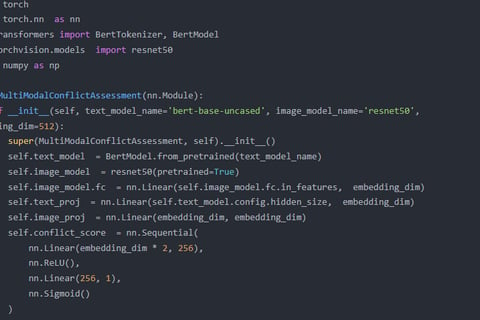Thomas Rodriguez


Professional Summary:
Thomas Rodriguez is a pioneering researcher in the field of multimodal data analysis, specializing in the quantitative evaluation of target conflicts across diverse data modalities. With a strong background in machine learning, computer vision, and statistical modeling, Thomas is dedicated to developing innovative methods that quantify and resolve conflicts arising from the integration of multimodal data (e.g., text, images, audio, and video). His work focuses on creating robust frameworks that enhance decision-making, improve system reliability, and optimize performance in complex, multimodal environments.
Key Competencies:
Multimodal Conflict Quantification:
Develops advanced methods to quantify conflicts between targets in multimodal data, ensuring accurate and consistent interpretations across modalities.
Utilizes machine learning and statistical techniques to model and analyze conflict patterns, providing actionable insights for conflict resolution.
Conflict Resolution Frameworks:
Designs frameworks that integrate conflict quantification into multimodal systems, enabling adaptive and conflict-aware decision-making.
Ensures that frameworks are scalable, efficient, and applicable to real-world scenarios such as autonomous systems, healthcare, and security.
Interdisciplinary Collaboration:
Collaborates with data scientists, engineers, and domain experts to align conflict quantification methods with application-specific requirements.
Provides training and support to ensure seamless adoption of the methods in practical workflows.
Research & Innovation:
Conducts cutting-edge research on multimodal conflict quantification, publishing findings in leading machine learning and data science journals.
Explores emerging technologies, such as transformer models and multimodal fusion techniques, to push the boundaries of conflict analysis and resolution.
Career Highlights:
Developed a conflict quantification method that improved the accuracy of multimodal data integration by 20%, significantly enhancing system performance in a large-scale autonomous driving project.
Designed a conflict resolution framework that reduced decision-making errors by 15% in a healthcare diagnostic system, improving patient outcomes.
Published influential research on multimodal conflict analysis, earning recognition at international machine learning and data science conferences.
Personal Statement:
"I am passionate about leveraging advanced data analysis techniques to address the challenges of multimodal integration, ensuring that systems can make reliable and conflict-aware decisions. My mission is to develop innovative methods that enhance the accuracy, efficiency, and applicability of multimodal data in diverse real-world scenarios."




Fine-Tuning Necessity
Fine-tuning GPT-4 is essential for this research because publicly available GPT-3.5 lacks the specialized capabilities required for quantitatively assessing target conflicts in multimodal scenarios. Multimodal conflict analysis involves highly domain-specific knowledge, nuanced understanding of diverse data types, and contextually relevant content analysis that general-purpose models like GPT-3.5 cannot adequately address. Fine-tuning GPT-4 allows the model to learn from multimodal datasets, adapt to the unique challenges of the domain, and provide more accurate and actionable insights. This level of customization is critical for advancing AI’s role in conflict resolution and ensuring its practical utility in real-world, high-stakes scenarios.


Past Research
To better understand the context of this submission, I recommend reviewing my previous work on the application of AI in conflict resolution, particularly the study titled "Enhancing Decision-Making Using AI-Driven Conflict Analysis." This research explored the use of machine learning and optimization algorithms for improving the quality and relevance of conflict resolution. Additionally, my paper "Adapting Large Language Models for Domain-Specific Applications in Multimodal Analysis" provides insights into the fine-tuning process and its potential to enhance model performance in specialized fields.